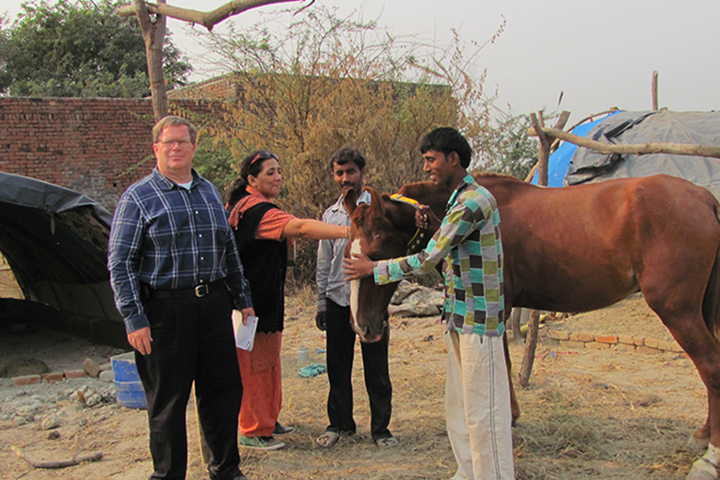Fighting polio has become a challenging job in in the areas where it remains. This disease that is all but forgotten in the United States still presents a threat to children elsewhere.
An Illinois State alum works on the front lines of the effort to eradicate polio. Alan Janssen ’75 is a health communications specialist for the federal Centers for Disease Control and Prevention’s (CDC) Global Polio Eradication Initiative. Janssen spends several weeks a year in some of the most remote villages in the world to support polio vaccination programs. For his work in Nigeria, he recently received the CDC’s Excellence in Frontline Public Health Service—International award.
The CDC is part of the Global Polio Eradication Initiative whose other members include Rotary, UNICEF, the World Health Organization (WHO), and the Bill and Melinda Gates Foundation. The initiative had tremendous success in eradicating polio in many places, like India, where the disease vanished almost three years ago, Janssen said. But the disease remains endemic to three countries—Afghanistan, Nigeria, and Pakistan—and has cropped up again in the Horn of Africa.
“It’s generally in areas that have inadequate vaccination programs such as remote areas, areas that are vaccine hesitant, or areas that have security issues,” said Janssen, a native of Pekin who lives in the Atlanta area.
Security has become a challenge to polio vaccination efforts. In Pakistan and Nigeria several health care workers who provide polio vaccination have been killed or injured. These attacks have resulted in changes to vaccination campaigns at the local level. “Each country is different,” Janssen said. “In some countries such as Pakistan, militant groups oppose vaccination, where in Afghanistan there is support for ending polio.”
“In efforts to overcome resistance to polio vaccination hesitancy, religious and traditional leaders have been given a special role in addressing misconceptions of vaccination. These trusted leaders often meet with polio vaccine resistant parents and encourage them to vaccinate their children,” Janssen said.
In several areas the polio vaccine has been incorrectly characterized as anti-Islam. The top Islamic leader in Nigeria, the Sultan of Sokoto, strongly supports the vaccination program and actively supports polio vaccination, speaking frequently about the importance of polio vaccination.
Janssen said he visits remote villages where people still live in mud huts with no electricity or wells, and where life hasn’t changed much in hundreds of years.
“You really are reaching out into areas and presenting new ideas to these villagers, so it gets to be a challenge from time to time,” he said.
Leaning on his ISU, teaching experience
He recounted a time he had to speak to 300 Koranic teachers in rural Borno State, Nigeria, which has traditionally been an area with polio vaccine resistance.
“All of a sudden I realized we had little in common; I remember thinking, ‘Oh my gosh, what am I going to say to this audience?’” he said.
Janssen tried to find common ground. He told the teachers that he, like them, once taught at schools in the middle of cornfields, and he tried to encourage them to promote the vaccination efforts by telling them how important teachers are to the health of their students and their future children.
It is times like those that Janssen pulls from his experiences as a teacher in rural Illinois and as a health education major at Illinois State.
“One of the things ISU really taught was that it provided a good background in terms of education and teaching,” Janssen said. “We do a lot of education and communications work, along with a lot of social mobilization, which is the organization of the communities to try and deliver the vaccines in some very difficult areas. So I think one of the things I learned was a lot of flexibility. We’ve got to be looking at new solutions every day.”
Janssen has worked at the CDC for the last 23 years. Before that he worked in rural health care development in Wichita, Kansas. He said his job provides a great opportunity to a make a difference in the lives of children.
“I think we have the ability to do that with vaccination in terms of preventing disease, at least infectious diseases globally,” he said.
Janssen meets with political, traditional, and religious leaders in order to promote polio eradication. His time in Kansas proved handy once, when he met a deputy governor in Sokoto State in northwestern Nigeria.
“You go through this dance that you do in terms of diplomacy,” Janssen said. “He was asking me where I was from. So I told him I grew up in Illinois and spent time in Kansas. It turned out that his son went to Kansas State. So he spent 20 minutes talking about K-State football. And then we got back into polio.”
“So you think you are in the middle of Africa, away from everything, but we are all very interconnected. And that’s really why we are doing a lot of this; we are reaching out with the efforts to do vaccinations (for) polio and measles and also other vaccines. Because in (the U.S.)—and you have seen it with measles in this country—we have brought in several cases this year and had several large outbreaks. So if we don’t maintain vaccination and we don’t prevent them elsewhere, they will come back to the U.S.”
After the government shutdown ends, Janssen plans to travel to Nairobi, Kenya, to support the communication efforts in the countries in the Horn of Africa that have experienced recent outbreaks of polio.
“I have the opportunity to work with people around the world, and what you find is that there are a lot of people who are really committed to trying to improve the health and lives of the folks in their countries,” he said.
Janssen’s ties to the University remain strong. He met his wife, Janette (Eicken) ’76, on Illinois State’s Quad, and he is a leader of the Atlanta Area Alumni Network.

